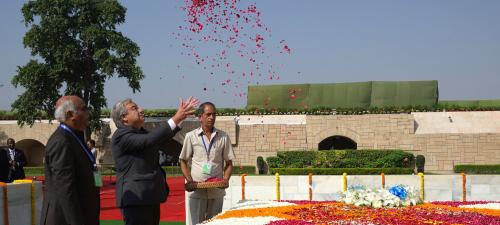UN chief marks Non-Violence Day, urging world to follow Gandhi’s example; ‘the greatest soul that ever lived’
On Tuesday, as part of his official visit to India this week, United Nations Secretary-General António Guterres laid a wreath in honour of Mahatma Gandhi, at the Raj Ghat Memorial, in New Delhi. Describing him as “the greatest soul that ever lived”, the UN chief said that Gandhi’s example “demonstrates that the way to reach objectives, is through non-violence.”

The UN Secretary-General António Guterres (r) pays tribute to Mahatma Gandhi at the Raj Ghat memorial in New Delhi on 2 October 2018 to mark the beginning of the celebrations of his 150th birthday.
Mr. Guterres called on the world to follow the “enduring vision and wisdom of Mahatma Gandhi” on the International Day of Non-Violence, which falls on 2 October - the birthday of the iconic leader who led India to independence, and inspired civil rights movements across the globe.
"As Secretary-General of the United Nations, I can only hope that all those that have political responsibility in the world are able to be worthy of Mahatma Gandhi and to understand that they should reach their objectives through dialogue, through non-violence, through a strong commitment to truth and too the well-being of their peoples.”
In his message for the day, the UN chief said that “at a time of protracted conflicts and complex challenges, Gandhi’s philosophy of non-violence remains an inspiration. At the United Nations, a world free of violence - and the resolution of differences through non-violent means - is at the core of our work.”
Mr. Guterres recalled Gandhi’s commitment to social justice. with inequality on the rise. He said it was important for a fairer globalization process to take root, based on human dignity, at a time when the world is “striving to achieve the Sustainable Development Goals, ensure gender equality and leave no one behind.”
The Charter of the United Nations, said the Secretary-General, with its call in Chapter VI for the use, “first of all”, of negotiation, mediation, arbitration, judicial settlement and other peaceful ways to address threats to peace, echoes the spirit of Gandhi’s statement that “non-violence is the greatest force at the disposal of mankind.”
Noting that Gandhi proved that non-violence can change history, Mr. Guterres called on the world to be inspired by Gandhi’s “courage and conviction as we continue our work to advance peace, sustainable development and human rights for all of the peoples of the world.”
Source:United Nations
- 230 reads
Human Rights
Ringing FOWPAL’s Peace Bell for the World:Nobel Peace Prize Laureates’ Visions and Actions

Protecting the World’s Cultural Diversity for a Sustainable Future

The Peace Bell Resonates at the 27th Eurasian Economic Summit

Declaration of World Day of the Power of Hope Endorsed by People in 158 Nations

Puppet Show I International Friendship Day 2020

